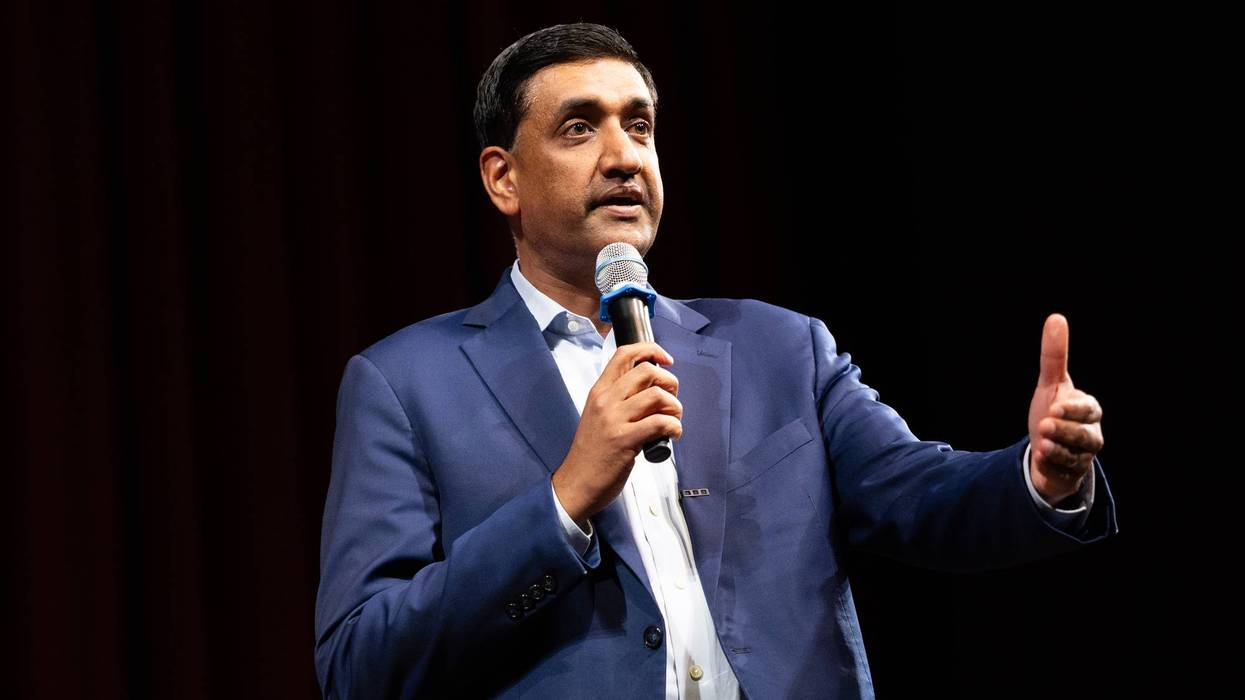March, 15 2016, 11:30am EDT

The Progressive Caucus Budget Blueprint Increases Public Investments to Target Full Employment and Faster Productivity Growth
An EPI Policy Center analysis of the Congressional Progressive Caucus's The People's Budget: Prosperity Not Austerity, a budget alternative for fiscal 2017, shows that if adopted, the budget would raise incomes for middle-class and low-income Americans. The fiscal boost provided by the People's Budget would increase GDP by 3 percent and create 3.6 million jobs over the first two years of its implementation, so long as the Federal Reserve accommodated this stimulus. It would bring us to 4 percent unemployment by 2018, while boosting long-run productivity growth through public investment.
WASHINGTON
An EPI Policy Center analysis of the Congressional Progressive Caucus's The People's Budget: Prosperity Not Austerity, a budget alternative for fiscal 2017, shows that if adopted, the budget would raise incomes for middle-class and low-income Americans. The fiscal boost provided by the People's Budget would increase GDP by 3 percent and create 3.6 million jobs over the first two years of its implementation, so long as the Federal Reserve accommodated this stimulus. It would bring us to 4 percent unemployment by 2018, while boosting long-run productivity growth through public investment. The budget reduces the deficit beginning in fiscal 2017 relative to CBO's current law baseline and would achieve primary budget balance and sustainable budget deficits in fiscal 2018 and beyond.
"The big boost to public investment that the People's Budget provides will help address two of the most glaring problems in the American economy today: a still-incomplete economic recovery and decelerating productivity growth." said EPI budget analyst Hunter Blair. "Further, the budget's target of genuine full employment is essential if low- and middle-wage workers are going to see significant gains in hourly pay in coming years."
The EPI Policy Center analysis finds that The People's Budget would have significant, measurable, positive impacts. Specifically, it would:
- Finally complete the economic recovery. The People's Budget would sharply accelerate economic and employment growth, boosting GDP by 3 percent and employment by 3.6 million jobs in the near term. This would both close the CBO estimate of the output gap and (if the Fed accommodated) achieve genuine full employment with the unemployment rate reduced to 4 percent.
- Make necessary public investments. The budget finances roughly $295 billion in job creation and public investment measures in calendar year 2016 alone and roughly $565 billion over calendar years 2016-2017, which will rapidly reduce labor market slack and restore the economy to full health. Further, the budget continues strong public investments even after full employment is achieved, which would help reverse recent declines in productivity growth.
- Facilitate economic opportunity for all. By expanding tax credits and other programs for low- and middle-wage workers, boosting public employment, and offering incentives for employers to create new jobs, The People's Budget aims to boost economic opportunity for all segments of the population, including those left out of the current recovery.
- Strengthen the social safety net. The People's Budget expands and extends emergency unemployment benefits and increases funding for education, training, employment, and social services as well as income security programs and proposes benefit enhancements, not cuts, in social insurance protections..
- Smartly cut spending. The budget focuses on modern security needs by repealing sequestration cuts and spending caps that affect the Defense Department but replacing them with similarly sized funding reductions that are less front-loaded and will allow more considered cuts.
- Increase tax progressivity and adequacy. The budget restores adequate revenue and pushes back against income inequality by adding higher marginal tax rates for millionaires and billionaires, equalizing the tax treatment of capital income and labor income, restoring a more progressive estate tax, eliminating inefficient corporate tax loopholes, levying a tax on systemically important financial institutions, and enacting a financial transactions tax, among other tax policies.
- Reduce the deficit in the medium term. The budget increases near-term deficits to boost job creation, but reduces the deficit in fiscal 2017 and beyond relative to CBO's current law baseline. In later years the budget reduces the ratio of debt to GDP when the economy is at full employment.
EPI will release a paper on Wednesday, March 16 which provides further evidence that the U.S. economy would still benefit from a fiscal boost, even with the progress made so far in recovering from the Great Recession. This paper will also provide empirical support for the view that conventional measures understate the degree of slack remaining in the U.S. economy, and that the 4 percent unemployment target in the People's Budget should be adopted.
EPI is an independent, nonprofit think tank that researches the impact of economic trends and policies on working people in the United States. EPI's research helps policymakers, opinion leaders, advocates, journalists, and the public understand the bread-and-butter issues affecting ordinary Americans.
(202) 775-8810LATEST NEWS
Trump Says Bombing of Iran to Continue 'Uninterrupted' After Reported Killing of Supreme Leader
"For Iranians already suffering under repression, sanctions, and economic hardship, this escalation will mean only more pain," said the president of the National Iranian American Council.
Feb 28, 2026
US President Donald Trump and Israeli officials claimed Iran's supreme leader, 86-year-old Ali Khamenei, was killed in an airstrike on Saturday, along with other senior Iranian figures.
The US and Israeli militaries targeted Khamenei and other Iranian leaders with their opening barrage of strikes, part of an operation that was reportedly planned for months—with the launch date decided weeks ago—even as Trump claimed to be open to a diplomatic off-ramp. NPR, citing an anonymous source, reported that an Israeli strike killed Khamenei.
Trump made clear that Khamenei's alleged killing, which the Iranian government has not confirmed, would not stop the deadly military onslaught, which the US president launched in coordination with Israel without authorization from Congress and in clear violation of international law. The US president said explicitly in remarks early Saturday that his goal was to topple the Iranian government—something that analysts stressed is not synonymous with assassinating the supreme leader.
In a Truth Social post, Trump wrote that "heavy and pinpoint bombing... will continue, uninterrupted throughout the week or, as long as necessary to achieve our objective of PEACE THROUGHOUT THE MIDDLE EAST AND, INDEED, THE WORLD!"
Iran has responded to the US and Israeli assault with drone and missile attacks on Israel and American military bases across the Middle East. The US Central Command said in a statement that there have not yet been any reports of American casualties and that "damage to US installations was minimal."
In Iran, more than 200 people have been killed by US-Israeli airstrikes and around 700 others injured, according to the Iranian Red Crescent, a toll that's sure to grow in the coming days as rescue workers search through rubble. More than 80 people—mostly young children—were killed in an Israeli strike on a school in southern Iran.
Jamal Abdi, president of the National Iranian American Council, said in a statement that "for Iranians already suffering under repression, sanctions, and economic hardship, this escalation will mean only more pain."
“Bombing Tehran will not bring security. It will endanger civilians, place US service members at risk, empower the most repressive and violent elements inside Iran, and destabilize the region for years to come," said Abdi. "Congress must act immediately to reassert its constitutional authority and halt further escalation. The pending War Powers resolutions must come to a vote without delay. Lawmakers must make clear that there is no authorization for war with Iran."
Keep ReadingShow Less
'More Horrific Death and Destruction Will Come,' Warns Tlaib as Israeli Strike Kills Dozens of Iranian Kids
"These acts of war threaten to ignite a catastrophic regional war that will make no one safer while unleashing unconscionable suffering," said US Rep. Rashida Tlaib.
Feb 28, 2026
More than 50 young children were reportedly killed Saturday by an Israeli airstrike on southern Iran as the US and Israel carried out joint attacks across the country. A local official told Iranian state media that "an Israeli missile attack" hit a girls' elementary school in Minab.
Saturday is a school day in Iran. A school staff member told Middle East Eye that "you could hear the sound of children crying and screaming" following the strike.
“We still don’t know how many are under the rubble," said the unnamed staffer. "Some are even saying more than 100. Some of these small children are severely injured. Their parents have come to the school, and this place has turned into a house of mourning.”
Iranian media now report 40 killed and 48 students injured following the strike on a girls’ elementary school in Minab, as rescue and recovery efforts continue. https://t.co/kCR6Gagvip pic.twitter.com/faBFkgFn3D
— Ali Hashem علي هاشم (@Alihashem) February 28, 2026
Iranian Foreign Minister Abbas Araghchi wrote on social media that the school "was bombed in broad daylight, when packed with young pupils."
"Dozens of innocent children have been murdered at this site alone," he added. "These crimes against the Iranian people will not go unanswered."
Al Jazeera noted that "separately, Iran’s Mehr news agency reported that at least two students were killed by another Israeli attack that hit a school east of the capital, Tehran."
“Every war is a war on children," said Inger Ashing, CEO of the global humanitarian group Save the Children. "All children have the right to access a safe education, and schools should always be a haven for children—not a battlefield."
In a statement, US Rep. Rashida Tlaib (D-Mich.) alluded to the Minab school bombing as she condemned President Donald Trump for "acting on the violent fantasies of the American political elite and the Israeli apartheid government, ignoring the vast majority of Americans who say loud and clear: No More Wars."
"The Trump administration and Israeli regime’s illegal war of aggression on Iran has already killed dozens of children, and more horrific death and destruction will come," Tlaib warned. "These acts of war threaten to ignite a catastrophic regional war that will make no one safer while unleashing unconscionable suffering."
“President Trump will pretend this is about democracy and the rights of the Iranian people," she continued. "Don’t be fooled, Trump does not care about the Iranian people. The Iranian people are not pawns for the interests of foreign powers. Our government has imposed brutal sanctions that have destroyed the Iranian economy and the lives and livelihoods of millions of people. You cannot ‘free’ people by killing them and destroying their country."
Tlaib issued her statement shortly after Trump declared in a Washington Post interview that he decided to wage war on Iran to secure "freedom for the people." As of this writing, the White House has not responded to the Minab school massacre. (Update: A spokesperson for the US Central Command said in a statement that "we are aware of reports concerning civilian harm resulting from ongoing military operations. We take these reports seriously and are looking into them. The protection of civilians is of utmost importance, and we will continue to take all precautions available to minimize the risk of unintended harm.")
"I want a safe nation, and that’s what we’re going to have," Trump said as the US-Israeli onslaught hurled the Middle East into chaos.
Tlaib said in her statement that the US Congress "must stop the bloodshed by immediately reconvening to exert its war powers and stop this deranged president."
"But let’s be clear: Warmongering politicians from both parties support this illegal war, and it will take a mass anti-war movement to stop it," she added.
Keep ReadingShow Less
Demanding Action From Congress, Khanna Says 'The American People Are Tired of Regime Change Wars'
"We don't want to be at war with a country of 90 million people in the Middle East," said Democratic US Rep. Ro Khanna.
Feb 28, 2026
US Rep. Ro Khanna on Saturday demanded swift action from Congress to stop the Trump administration's unauthorized military assault on Iran, saying in a video posted to social media that "the American people are tired of regime change wars that cost us billions of dollars and risk our lives."
"We don't want to be at war with a country of 90 million people in the Middle East," said Khanna (D-Calif.), calling on Congress to reconvene for a vote on Monday.
"Every member of Congress should go on record today on how they will vote on Thomas Massie and my War Powers resolution," Khanna added, referring to the Kentucky Republican who is co-leading the measure.
If passed, the resolution would require the president "to terminate the use of United States Armed Forces from hostilities against the Islamic Republic of Iran or any part of its government or military, unless explicitly authorized by a declaration of war or specific authorization for use of military force against Iran."
The White House reportedly only notified some members of the House and Senate Armed Services Committees after the US-Israeli military assault on Iran began. According to Reuters, an Israeli defense official said that "the operation had been planned for months in coordination with Washington, and that the launch date was decided weeks ago."
Watch Khanna's remarks:
Trump has launched an illegal regime change war in Iran with American lives at risk. Congress must convene on Monday to vote on @RepThomasMassie & my WPR to stop this. Every member of Congress should go on record this weekend on how they will vote. pic.twitter.com/tlRi3Vz849
— Ro Khanna (@RoKhanna) February 28, 2026
Days prior to the US-Israeli attack on Iran, the House Democratic leadership announced it would force a vote next week on the Khanna-Massie War Powers resolution following reports that top Democrats were slowwalking the measure behind closed doors.
Senate Democrats also said they planned to vote next week on a War Powers resolution led by Sens. Tim Kaine of Virginia.
In a statement on Saturday, Kaine called the US attacks on Iran "illegal" and said that "every single senator needs to go on the record about this dangerous, unnecessary, and idiotic action."
“Has President Trump learned nothing from decades of US meddling in Iran and forever wars in the Middle East? Is he too mentally incapacitated to realize that we had a diplomatic agreement with Iran that was keeping its nuclear program in check, until he ripped it up during his first term?" Kaine asked. "These strikes are a colossal mistake, and I pray they do not cost our sons and daughters in uniform and at embassies throughout the region their lives. The Senate should immediately return to session and vote on my War Powers resolution."
The chances of a War Powers resolution getting through the Republican-controlled Congress are virtually nonexistent, even though the American public overwhelmingly opposes US military action against Iran. Senate Majority Leader John Thune (R-SD) and House Speaker Mike Johnson (R-La.) both issued statements applauding Trump for the unauthorized Saturday attacks.
Cavan Kharrazian, senior policy adviser to the advocacy group Demand Progress, said that "Trump has no authority to launch another war on his own."
"The Constitution is clear. The need for a War Powers resolution is clear. Congress decides when this country goes to war, not the president," said Kharrazian. "Next week, every member of Congress will have to choose. Side with illegal, endless war, or side with the American people and reject yet another regime change war in the Middle East. Like with Iraq, the choice they make will echo loudly for years to come.”
Keep ReadingShow Less
Most Popular


